人教版(2019) 选择性必修第三册 Unit 5 Poems 单元过关复习课件-(18张)
文档属性
| 名称 | 人教版(2019) 选择性必修第三册 Unit 5 Poems 单元过关复习课件-(18张) |
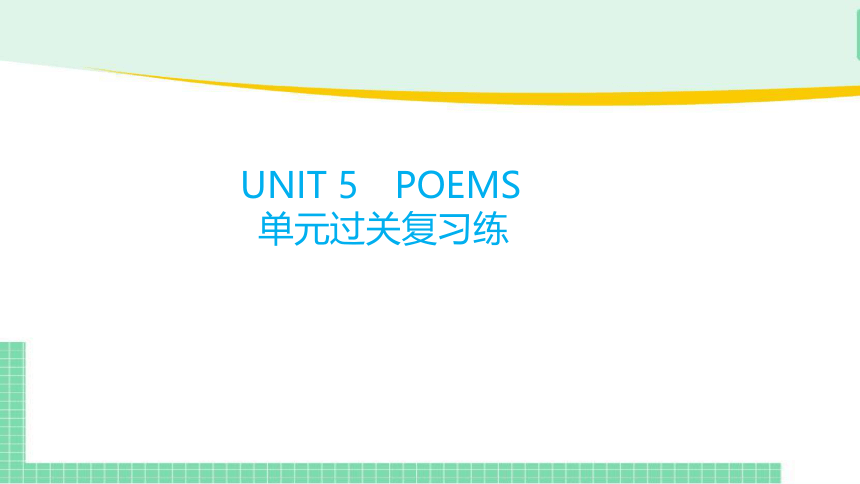
|
|
| 格式 | pptx | ||
| 文件大小 | 1.3MB | ||
| 资源类型 | 教案 | ||
| 版本资源 | 人教版(2019) | ||
| 科目 | 英语 | ||
| 更新时间 | 2022-09-16 00:00:00 | ||
图片预览

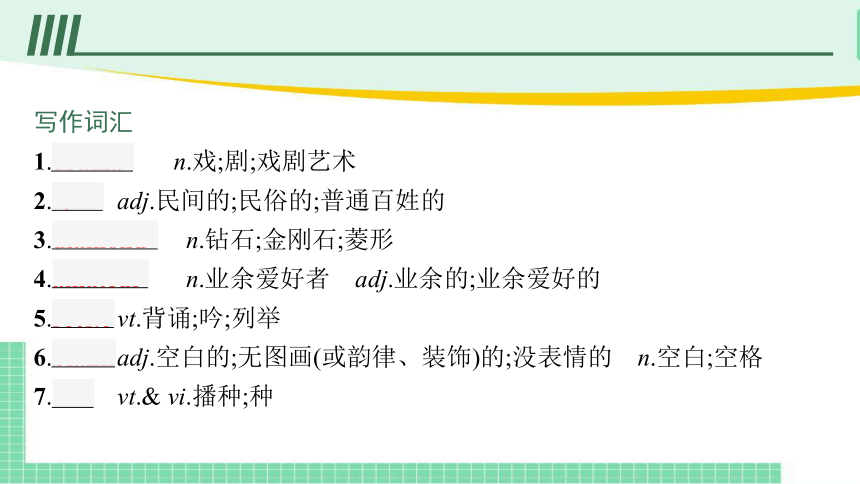
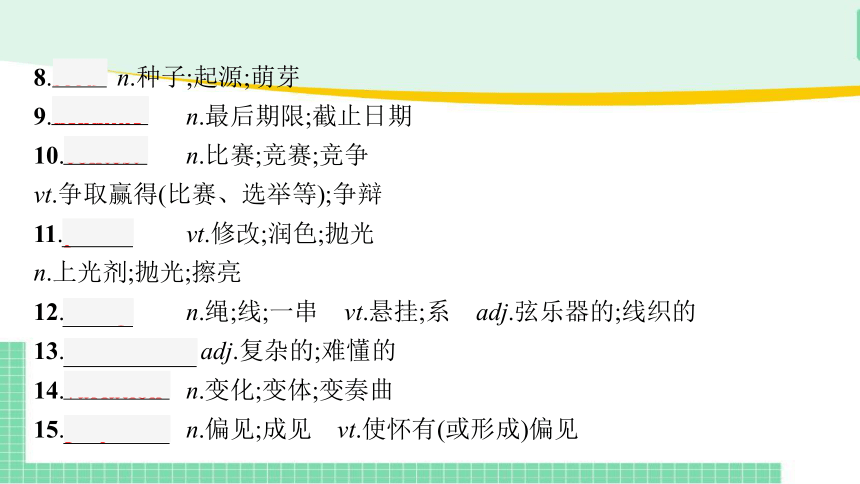
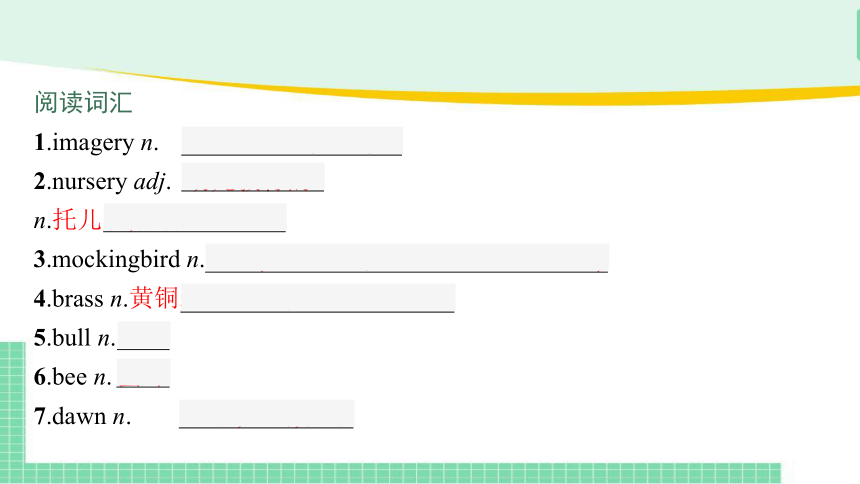
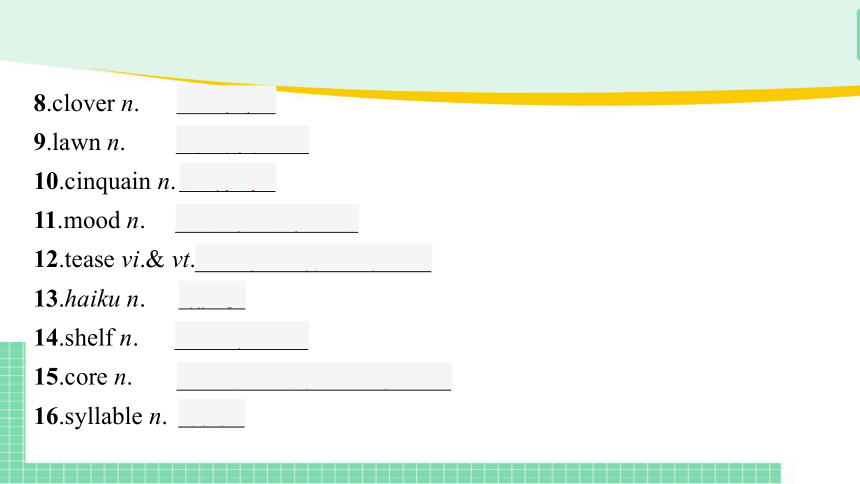
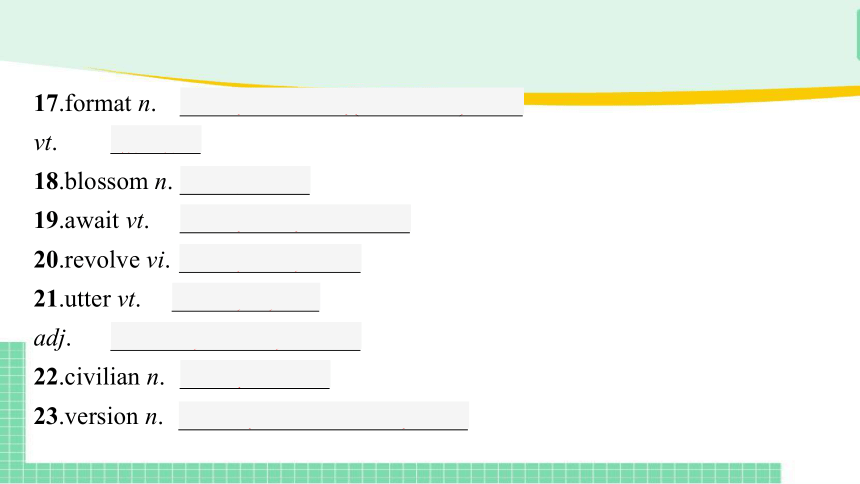
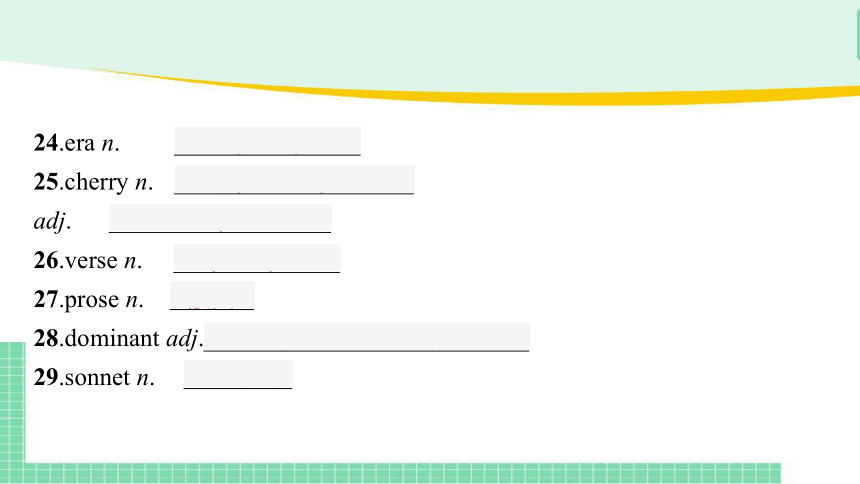
文档简介
(共18张PPT)
UNIT 5 POEMS
单元过关复习练
写作词汇
1.drama n.戏;剧;戏剧艺术
2.folk adj.民间的;民俗的;普通百姓的
3.diamond n.钻石;金刚石;菱形
4.amateur n.业余爱好者 adj.业余的;业余爱好的
5.recite vt.背诵;吟;列举
6.blank adj.空白的;无图画(或韵律、装饰)的;没表情的 n.空白;空格
7.sow vt.& vi.播种;种
8.seed n.种子;起源;萌芽
9.deadline n.最后期限;截止日期
10.contest n.比赛;竞赛;竞争
vt.争取赢得(比赛、选举等);争辩
11.polish vt.修改;润色;抛光
n.上光剂;抛光;擦亮
12.string n.绳;线;一串 vt.悬挂;系 adj.弦乐器的;线织的
plicated adj.复杂的;难懂的
14.variation n.变化;变体;变奏曲
15.prejudice n.偏见;成见 vt.使怀有(或形成)偏见
阅读词汇
1.imagery n. 形象的描述;意象;像
2.nursery adj. 幼儿教育的
n. 托儿所;保育室
3.mockingbird n.嘲鸫(美洲鸣禽,能模仿别种鸟的鸣叫)
4.brass n. 黄铜;黄铜制品;铜管乐器
5.bull n. 公牛
6.bee n. 蜜蜂
7.dawn n. 黎明;开端;萌芽
8.clover n. 三叶草
9.lawn n. 草坪;草地
10.cinquain n. 五行诗
11.mood n. 情绪;心情;语气
12.tease vi.& vt.取笑(某人);揶揄;逗弄
13.haiku n. 俳句
14.shelf n. 架子;搁板
15.core n. 核心;精髓;(水果的)核儿
16.syllable n. 音节
17.format n. 格式;总体安排;(出版物的)版式
vt. 格式化
18.blossom n. 花朵;花簇
19.await vt. 等候;期待;将发生在
20.revolve vi. 旋转;环绕;转动
21.utter vt. 出声;说;讲
adj. 完全的;十足的;彻底的
22.civilian n. 平民;老百姓
23.version n. 版本;(从不同角度的)说法
24.era n. 时代;年代;纪元
25.cherry n. 樱桃;樱桃树;樱桃色
adj. 樱桃色的;鲜红色的
26.verse n. 诗;韵文;诗节
27.prose n. 散文
28.dominant adj.首要的;占支配地位的;显著的
29.sonnet n. 十四行诗
30.wherever conj. 在任何地方;在所有……的情况下
adv.(用于问句)究竟在(到)哪里
31.barren adj. 贫瘠的;不结果实的
32.grief n. 悲伤;悲痛;伤心事
33.butterfly n. 蝴蝶
『词汇变形』
1.sorrow n.悲伤;悲痛;伤心事 vt.感到悲伤→sorrowful adj.悲伤的;悲痛的→sorrowfully adv.悲伤地;悲痛地
2.literary adj.文学的;爱好文学的;有文学作品特征的→literature n.文学
3.rhyme n.押韵词;押韵的短诗 vi.& vt.使押韵→rhythm n.节奏;韵律;规律
4.respective adj.分别的;各自的→respectively adv.分别;各自;依次为
5.comprehension n.理解力;领悟力;理解练习→comprehend vt.理解
6.delicate adj.精美的;精致的;脆弱的→delicately adv.精美地;精致地;脆弱地
7.sympathy n.同情;赞同→sympathetic adj.同情的;有同情心的;赞同的
8.innocence n.天真;单纯;无罪→innocent adj.天真无邪的;无辜的;无恶意的
9.correspond vt.相一致;符合;相当于;通信→correspondence n.来往信件;通信联系
10.race n.种族→racial adj.种族的;人种的
『语境活用』
1.If nobody can prove your innocence,how can you say you are innocent (innocent)
2.When I’m thinking of my mother,I get depressed and sorrowful with tears in my eyes.(sorrow)
3.The Chinese and Western clothing formations have their own origins respectively and receive respective lifestyles.(respective)
4.Women often feel men are too direct and not sympathetic enough.(sympathy)
5.The course features creative writing exercises and listening comprehension.(comprehend)
6.In African languages there is a close correspondence between sounds and letters.(correspond)
常用短语
1.be made up of 由……组成(或构成)
2.compare with 与……相比
3.make sense 有意义
4.be popular with 受……的欢迎
5.in particular 尤其;特别
6.transform into 变成
『词块』
1.nursery rhyme童谣;儿歌
2.billy goat 公山羊
3.dew drop 露珠;水珠
4.cherry blossom樱花
5.to the point切题的;中肯的
6.in your own words用你自己的话
7.in distinctive voices以独特的声音
8.at the approach of在快到……的时候
9.at play在玩耍
10.in laughter在欢笑中
11.in tears在哭泣
12.at rest在休息
13.bring sb great success给……带来成功
14.fall in love with爱上
15.in secret秘密地
16.have an influence on对……有影响
17.be familiar with熟悉
18.from beginning to end从头至尾
19.in the heart of在……的心里
20.take delight (in)高兴
语篇填空
The reasons why people write poems are different and poets use many different forms 1.to express (express) themselves.Some of the first poetry a child learns in English is nursery rhymes,2.whose language is concrete but 3.imaginative(imagine).They have a strong rhythm and a lot of repetition,which make small children 4.delighted (delight).
One of the 5.simplest (simple) kinds is list poems.They have a flexible line length and 6.repeated (repeat) phrases which give both a pattern and a rhythm to the poem.Another simple form of poem is the cinquain,which 7.is made(make) up of five lines.This kind of poem can convey a strong picture in just a few 8.words (word).The Japanese Haiku is made up of 17 syllables and is very popular 9.with English writers because it is easy to write.
English speakers like Tang poetry from China 10.in particular and a lot of them has been translated into English.
UNIT 5 POEMS
单元过关复习练
写作词汇
1.drama n.戏;剧;戏剧艺术
2.folk adj.民间的;民俗的;普通百姓的
3.diamond n.钻石;金刚石;菱形
4.amateur n.业余爱好者 adj.业余的;业余爱好的
5.recite vt.背诵;吟;列举
6.blank adj.空白的;无图画(或韵律、装饰)的;没表情的 n.空白;空格
7.sow vt.& vi.播种;种
8.seed n.种子;起源;萌芽
9.deadline n.最后期限;截止日期
10.contest n.比赛;竞赛;竞争
vt.争取赢得(比赛、选举等);争辩
11.polish vt.修改;润色;抛光
n.上光剂;抛光;擦亮
12.string n.绳;线;一串 vt.悬挂;系 adj.弦乐器的;线织的
plicated adj.复杂的;难懂的
14.variation n.变化;变体;变奏曲
15.prejudice n.偏见;成见 vt.使怀有(或形成)偏见
阅读词汇
1.imagery n. 形象的描述;意象;像
2.nursery adj. 幼儿教育的
n. 托儿所;保育室
3.mockingbird n.嘲鸫(美洲鸣禽,能模仿别种鸟的鸣叫)
4.brass n. 黄铜;黄铜制品;铜管乐器
5.bull n. 公牛
6.bee n. 蜜蜂
7.dawn n. 黎明;开端;萌芽
8.clover n. 三叶草
9.lawn n. 草坪;草地
10.cinquain n. 五行诗
11.mood n. 情绪;心情;语气
12.tease vi.& vt.取笑(某人);揶揄;逗弄
13.haiku n. 俳句
14.shelf n. 架子;搁板
15.core n. 核心;精髓;(水果的)核儿
16.syllable n. 音节
17.format n. 格式;总体安排;(出版物的)版式
vt. 格式化
18.blossom n. 花朵;花簇
19.await vt. 等候;期待;将发生在
20.revolve vi. 旋转;环绕;转动
21.utter vt. 出声;说;讲
adj. 完全的;十足的;彻底的
22.civilian n. 平民;老百姓
23.version n. 版本;(从不同角度的)说法
24.era n. 时代;年代;纪元
25.cherry n. 樱桃;樱桃树;樱桃色
adj. 樱桃色的;鲜红色的
26.verse n. 诗;韵文;诗节
27.prose n. 散文
28.dominant adj.首要的;占支配地位的;显著的
29.sonnet n. 十四行诗
30.wherever conj. 在任何地方;在所有……的情况下
adv.(用于问句)究竟在(到)哪里
31.barren adj. 贫瘠的;不结果实的
32.grief n. 悲伤;悲痛;伤心事
33.butterfly n. 蝴蝶
『词汇变形』
1.sorrow n.悲伤;悲痛;伤心事 vt.感到悲伤→sorrowful adj.悲伤的;悲痛的→sorrowfully adv.悲伤地;悲痛地
2.literary adj.文学的;爱好文学的;有文学作品特征的→literature n.文学
3.rhyme n.押韵词;押韵的短诗 vi.& vt.使押韵→rhythm n.节奏;韵律;规律
4.respective adj.分别的;各自的→respectively adv.分别;各自;依次为
5.comprehension n.理解力;领悟力;理解练习→comprehend vt.理解
6.delicate adj.精美的;精致的;脆弱的→delicately adv.精美地;精致地;脆弱地
7.sympathy n.同情;赞同→sympathetic adj.同情的;有同情心的;赞同的
8.innocence n.天真;单纯;无罪→innocent adj.天真无邪的;无辜的;无恶意的
9.correspond vt.相一致;符合;相当于;通信→correspondence n.来往信件;通信联系
10.race n.种族→racial adj.种族的;人种的
『语境活用』
1.If nobody can prove your innocence,how can you say you are innocent (innocent)
2.When I’m thinking of my mother,I get depressed and sorrowful with tears in my eyes.(sorrow)
3.The Chinese and Western clothing formations have their own origins respectively and receive respective lifestyles.(respective)
4.Women often feel men are too direct and not sympathetic enough.(sympathy)
5.The course features creative writing exercises and listening comprehension.(comprehend)
6.In African languages there is a close correspondence between sounds and letters.(correspond)
常用短语
1.be made up of 由……组成(或构成)
2.compare with 与……相比
3.make sense 有意义
4.be popular with 受……的欢迎
5.in particular 尤其;特别
6.transform into 变成
『词块』
1.nursery rhyme童谣;儿歌
2.billy goat 公山羊
3.dew drop 露珠;水珠
4.cherry blossom樱花
5.to the point切题的;中肯的
6.in your own words用你自己的话
7.in distinctive voices以独特的声音
8.at the approach of在快到……的时候
9.at play在玩耍
10.in laughter在欢笑中
11.in tears在哭泣
12.at rest在休息
13.bring sb great success给……带来成功
14.fall in love with爱上
15.in secret秘密地
16.have an influence on对……有影响
17.be familiar with熟悉
18.from beginning to end从头至尾
19.in the heart of在……的心里
20.take delight (in)高兴
语篇填空
The reasons why people write poems are different and poets use many different forms 1.to express (express) themselves.Some of the first poetry a child learns in English is nursery rhymes,2.whose language is concrete but 3.imaginative(imagine).They have a strong rhythm and a lot of repetition,which make small children 4.delighted (delight).
One of the 5.simplest (simple) kinds is list poems.They have a flexible line length and 6.repeated (repeat) phrases which give both a pattern and a rhythm to the poem.Another simple form of poem is the cinquain,which 7.is made(make) up of five lines.This kind of poem can convey a strong picture in just a few 8.words (word).The Japanese Haiku is made up of 17 syllables and is very popular 9.with English writers because it is easy to write.
English speakers like Tang poetry from China 10.in particular and a lot of them has been translated into English.
